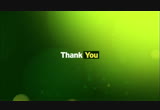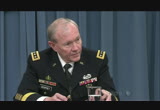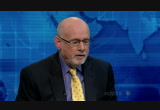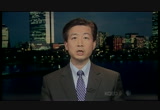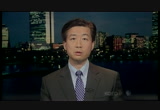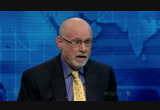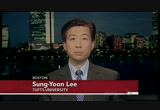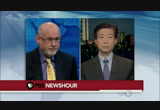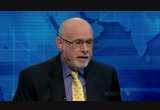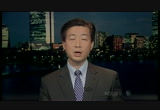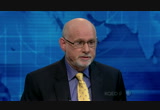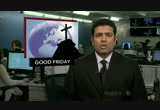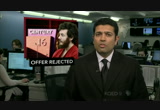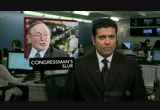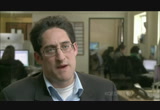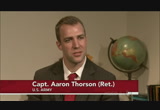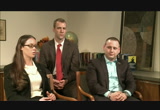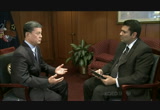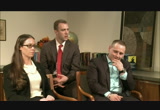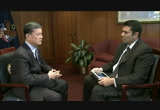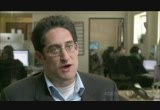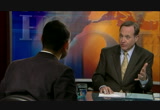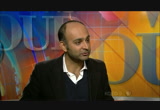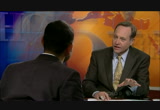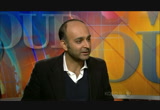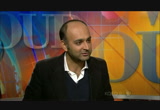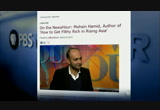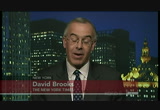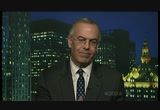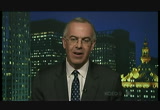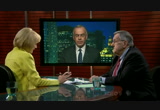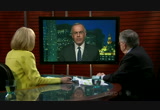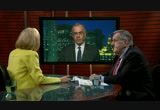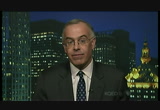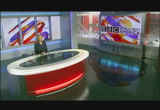tv PBS News Hour PBS March 29, 2013 3:00pm-4:00pm PDT
3:00 pm
>> suarez: the temperature kept rising on the korean peninsula today, at least judging from public pronouncements. the communist north declared its missile forces are ready to launch at american targets. filled pyongyang's main square more than 100,000 north koreans filled pyongyang's main square today, shouting "death to the u.s. imperialists." the mass rally coincided with a new threat. state television announced north korean leader kim jong un has decided the time has come to settle accounts with the u.s. >> ( translated ): he has signed the plan on technical preparations of strategic rockets of the korean people's army, ordering them to be on standby for fire so that they are able to strike at any time the u.s. mainland and its military bases in the pacific, including hawaii and guam, and those in south korea. >> suarez: state media also released photographs of kim and his senior generals during an
3:01 pm
emergency meeting late last night. they're seen looking at a map, purportedly showing u.s. cities that might be targeted by north korean missiles. the white house responded through a spokesman traveling with president obama today. he said bellicose rhetoric only deepens north korea's isolation. on thursday, a more forceful demonstration: a pair of b-2 stealth bombers flew 6,500 miles to south korea and back, as part of ongoing joint military exercises een the two nations. the chairman of the joint chiefs, general martin dempsey, addressed the flight during a briefing with defense secretary chuck hagel. >> the reaction to the b2 that we're most concerned about is not necessarily the reaction it might elicit in north korea, but rather among our japanese and korean allies. you know those exercises are mostly to assure our allies that they can count on us to be prepared to and to help them deter conflict.
3:02 pm
>> suarez: all of this began with north korea's latest nuclear test in february. that prompted the u.n. nations security council to impose its latest round of sanctions against the north. and in turn, the north began a barrage of threats and other steps, from canceling the armistice that ended the korean war to cutting off various hot lines to the south. still, north korea's closest ally, china, called today for restraint. >> ( translated ): upholding the peace and stability of the korean peninsula as well as northeast asia serves the common interests of all parties and it's also their common responsibility. we hope that relevant parties will work together in pushing for a turnaround of the tense situation. >> suarez: and for all the war talk, some economic cooperation has continued between north and south korea. workers and vehicles from the south are still being allowed to travel to a shared industrial park that generates millions of dollars for the north.
3:03 pm
i'm joined by joel wit. during his 15-year career at the state department, he focused on north korea. he's now a visiting scholar at the u.s. korea institute at the johns hopkins school of advanced international studies. he also is the founder and co-editor of 38-north, a website devoted to north korea analysis. and sung-yoon lee is an assistant professor of international politics at tufts university's fletcher school. joel wit, are we closer to war today than we were even just a week ago? a real shooting war in northeast asia? >> i think this is an extremely serious situation. and i would say that we are one step away from a second korean war. and i say that because in this kind of tense situation, the danger of miscalculation or accidental conflict is very high. and so this is a very dangerous situation.
3:04 pm
and we need to be very careful sz professor lee, do agree? are we really in more jeopardy than we were just a few weeks ago? >> well, we have seen a crescendo of-- barrage. i don't think we are on the brink of war. because we know the north korean regime harbors no suicidal impulses. i don't necessarily warrant to paint the north korean reg only as all knowing brilliant omnipotent brilliant strategist. there is the possibility of miscalculation but we have seen north korea resort to periodic, deadly but there are attacks against the south and the united states forces in south korea ever o the past 60 years. and i think the north korean regime views this period, 2013, as a particularly appeasement-prone time. and hence, it's in north korea's interest to raise the stakes, paint washington and seoul into a corner with a view towards receiving more economic concessions in
3:05 pm
the future sz well, professor, having said that, when any country, north korea or any country on the planet makes threats of the kind that were made in the past 24 hours, does the united states have to take them serious? >> this is north korea's preferred strategy of graduated escalation. its psychological warfare. and the u.s. and the rok, the republic of korea, the former name for south korea have also been engaging in psychological warfare of their own. we should take the north korean threat seriously because there's a high likelihood that north korea will, once again, resort to a deadly attack against south korea. north korea has shown a proclivity to launch such attacks and provocative acts on a major holiday. so perhaps even this easter sunday is an om tune time for another prove-- opportune time for provocation. rz joel wit, they are said to show honolulu, washington it krferments-- it c, los
3:06 pm
angeles, do we have a very good idea of what north korea is capable of and what it's not? >> yes, i think we have an excellent idea. and we have that because we have observed their missile test. and we know how far those missiles can go even if they work. and the fact is, they haven't really worked very well. so they can't really reach the continental united states. secondly, i want to return to this point about whether we're close to a war or not. and i would say that the problem here is, and the professor has even predicted when a provocation might happen. the problem is that if north korea launches a provocation, the united states and south korea, unlike in the past, are likely to respond. and north korea is not going to roll over and play dead, contrary to what a number of conservatives are saying sz but do you agree with the professor's conclusion that the countries that's in real jeopardy, not the united
3:07 pm
states in these threats, but south korea. >> shutly, south korea is in great jeopardy here. and as a close ally of the united states, that's very important to us. and we also have to remember we have 28,000 troops on the peninsula. and are committed to south korea's defense. so if there is another korean war, it's going to involve thousands, tens of thousands, maybe hundreds of thousands of american troops. rz sz professor, nations around the world have toolboxes, various mixtures of threats, persuasions, inducement, that is part of how diplomacy gets carried on. are the rules different for dealing with north korea than almost any other country on earth? >> well, in the case of north korea, when you consider teaching federal relations with other states and the international community at large, federal relation for north korea means what we have right now. creating a near crisis
3:08 pm
situation with a view towards returning to negotiations and over the past 20 years, of nuclear diplomacy, that has always meant returning to talks with big brandishment, bigger rewards in toe. so yes, we have dealt with north korea in a way that has not been a spectacular success. it's time to put some real stick in that proverbial carrot and stick approach. and i would say it has been all brandishment and concession so far. >> joel wit. >> i have experience actually working with north koreans. i spent 15 years in the state department working with them. and i can say that it's not a record of failure. in fact, the agreement we reached in 1994 stopped north korea from building as many as 100 nuclear weapons by 2000. so that agreement worked. there have been other agreements that haven't worked so well. it's been a very mixed record. and i agree with the
3:09 pm
professor that we need to get tough with the north koreans. but getting tough in and of itself is not a policy. you need to use diplomacy too to find escape routes for both parties. >> but when you use diplomacy do any of the standard tools of a diplomat, when dealing with another country, work with this country? >> they do work without. i was part of an agreement as i said in 1994 that worked very well for eight years. most people don't know that in the late 2000s there was another agreement with north korea, a moratorium on its long-range missile tests that lasted seven years. it worked very well. so the record is not an unblemished record of failure. it's a record of mixed success and mixed failure. and so that means we still need to continue to try to work on a diplomatic track. >> professor quickly, before we go, when statements like
3:10 pm
the kind that come out of pyongyang in the last couple of days are issued, is that paranoia as gesture, or is there a real belief among the leading cadre there that, in fact, the united states does want to take over, steamroll, em ol ate this country? -- emolate this country. >> it's posturing. i don't think the north korean regime believes that the u.s. is on the verge of attacking north korea. that is not in the best interest of the united states. we tend to take a patronizing view of the north korean regime because they are so bizarre and unusual in so many ways. but they are quite rational, careful and self-preservation is of the utmost priority for the regime. i don't have any experience working in government or dealing with north korea. but what i do know is that the clinton administration paid north korea almost $200
3:11 pm
million worth of food aid for the empty privilege of inspecting an empty cave in the aftermath of north korea firing a long-range missile over japan on august 31st, 1998. the bush administration has similar failed record in dealing with north korea. it removed north korea from the state-sponsored terrorism list in october of 2008. resumed food aid, negotiated with north korea again. north korea blew up the tires of a cooling tire if he main facility and continued to enrich uranium. >> very quickly, i mean that record is an actual record, of things that really happened. >> you know, i disagree with that characterization. and i go back to the fact that when i was in the u.s. government looking at intelligence estimates in the early 1990s, we were looking at a program that was enormous. and by the bush administration we had turned that off, and the north
3:12 pm
koreans had moved to develop another kind of nuclear weapon. >> joel wit, professor lee, gentlemen, thank you both. >> thank you. >> thank you. >> woodruff: still to come on the "newshour": new rules for auto emissions; long wait times at the veterans administration; one man's journey from poor boy to corporate tycoon. plus, shields and brooks. but first, the other news of the day. here's hari sreenivasan. a grand jury in atlanta today indicted the city's former school superintendent beverly hall in a cheating scandal. hall and 34 other educators were charged with fixing standardized test outcomes to show artificially high scores. a state investigation in 2011 found nearly 180 educators took part in the cheating. hall resigned days before the report. christians christians around the world marked good friday today, as they readied for easter sunday. from pilgrims to the pope, believers took part in services and ceremonies to commemorate the crucifixion of jesus.
3:13 pm
in jerusalem's old city, thousands of christian pilgrims retraced the way of suffering-- believed to be the route jesus took to his crucifixion. an alabama priest played the role of christ, flanked by men dressed as roman soldiers. others also carried wooden crosses as part of the procession. in the west bank, palestinian christians used an alternative route, after israeli security blocked their entry to jerusalem. >> what our people are doing today, they are walking the real via dolorosa, the one we have today between two settlements, around the wall, around checkpoints. they are also demonstrating because they don't have the right to get to jerusalem, a few >> sreenivasan: at the vatican, pope francis presided over his first good friday since being named pontiff earlier this month. and elsewhere, thousands gathered in germany for a mock crucifixion. >> ( translated ): easter is the most important holiday for the catholics and it was very authentic what was shown here.
3:14 pm
maybe it makes people a little more attached to religion. >> sreenivasan: the re-enactment were for real in the northern philippines, where some two dozen devotees were nailed to crosses again this year. holy week-- for roman catholics and protestants-- concludes this weekend, with easter sunday. orthodox christians will mark easter in may. in iraq, a series of car bombings rocked shiite mosques today, killing at least 23 people and wounding dozens. four of the attacks were in the capital, baghdad, and one took place in the northern city of kirkuk. they struck as worshippers left friday prayers. the bombings bore the hallmarks of al-qaeda in iraq, but no one claimed responsibility. prosecutors in colorado are refusing to let james holmes plead guilty in the aurora movie theater shootings last summer. holmes made the offer this week, and agreed to accept life in prison to avoid the death penalty. but prosecutors said thursday there's no deal because the defense has refused to hand over key information. holmes is accused of killing 12 people and wounding up to 70 in
3:15 pm
the july 20th shootings. president obama pushed plans today to attract private funds for rebuilding roads, bridges and other infrastructure. he said it would help create construction jobs. the president flew to the port of miami, undergoing $2 billion in public and private upgrades. >> we still have all kinds of we still have too many ports that aren't equipped for today's world commerce, we've still got too many rail lines that are too slow and clogged up. we've still got too many roads that are in disrepair, too many bridges that are unsafe, we don't have to accept that for america. we can do better. we can build better. >> sreenivasan: public-private partnerships were a key part of the president's economic agenda in his state of the union address last month. republican congressman don young of alaska drew a rebuke today for referring to hispanic workers with a racial slur. in an interview yesterday, young said his father once employed, quote, "50 to 60 wetbacks" on his california farm. later, he said he meant no disrespect. today, house speaker john boehner demanded an apology.
3:16 pm
he called young's remarks "offensive and beneath the dignity of the office he holds." young is 79, and now in his 21st term as alaska's lone congressman. there was good news today on former south african president nelson mandela. doctors in pretoria reported he is making progress and is in good spirits. mandela is 94 years old. he was taken to the hospital late wednesday night for a lung infection-- his third hospitalization in four months. those are some of the day's major stories. now, back to judy. >> woodruff: and we turn to the e.p.a.'s new regulations requiring cleaner gasoline. the obama administration announced the proposed changes today: they would require two-thirds less sulfur in gasoline and a reduction in other emissions beginning in 2017. they also would set tighter pollution limits for new vehicles themselves at the same time. the e.p.a. says it would reduce premature deaths and improve public health for a minimal cost. but opponents say it could hit consumers at the pump by adding as much as nine cents a gallon.
3:17 pm
juliet eilperin broke this story for the "washington post" and she joins me now. welcome to the newshour. >> thanks so much. >> so why is the obama administration doing this, putting these proposals out there? >> there are a couple of reasons. one is the fact that they are requiring vehicles to be cleaner in the years ahead. they've basically reduced greenhouse-gas emissions from these vehicles. and so you will see between 2016 and 2025, the vehicles are going to become much more efficient, get more piles -- miles per gallon. so one of the things automakers are asking for is for cleaner fuels because the sulfur in gasoline really affects the catalytic converter and makes it less efficient, results in more tailpipe emissions. so they actually have an incentive to have cleaner fuel. >> so i was going to say, it is interesting who is in favor of this, it is not just the environmental advocates, it's the car manufacturers. >> absolutely. the car manufacturers who already basically have to comply with these rules in california, which is a huge part of the u.s. market,
3:18 pm
have asked for uniformity. and so they were actually in the office of management of budget just this month asking for these rules to come through. and so that's one of the reasons why the obama administration was comfortable moving ahead with this. >> now on the other side is the oil & gas industry. and what is the argument they're making? >> they're argument is that oil refineries in the united states, which aren't quite as profitable as say the big oil companies, will take a hit because it will be expensive to reduce the sulfur in their emissions. they've already reduced it 90% since 2004 because of federal regulations. and they're saying it will both be costly for them to do this, and also in fact t will require more energy which will increase their carbon output. >> but the administration is disputing that. so what is the administration basing their argument? >> the administration ask saying that this will address than a penny a gallon to any gallon of gasoline. and they say that first of all the oil industry is inflating their statistics. they've done a survey of refineries and looked at
3:19 pm
what kind of modifications, that only a tiny fraction of the roughly 140 refineries in the country will have to do a major overhall. and also they allowed for flexibility in the proposal, so that the smallest refineries and the ones that will take the biggest hit will have, you know, an easier transition. >> but the industry, the oil & gas industry is pushing back? >> absolutely. they're saying that, you know, on average it will at least be 2 cents per gallon and in some instances it's going to be as much as 9 cents because they estimate it will cost $10 billion to do the upgrades they will need. >> and it is my understanding also the administration is saying that this will save money in terms of public-health costs. >> absolutely. when you do the math, what they are saying is because these tailpipe emissions, nitrogen oxide, soot, things like that, volatile organic compounds, those can contribute both to smog and in the case of soot, also to heart and lung disease. so overall they're saying that by 2013,-- 2030 the benefits will be between 8
3:20 pm
and $23 billion outweighing the cost of compliance. >> and just to clarify, juliet, the argument here is that it's not that the sulfur itself in gasoline is the problem, it's what it does to the catalytic converter, the emission device. >> that's what is very interesting. basically the more sulfur you have, the less effective the catalytic converter is so as a result you have greater tailpipe emissions and it is the emission, the volatile organic compounds, nitrogen oxide, carbon monoxide and soot is what affects the air we breathe and what it does to heart and lungs. >> let's broaden this out because at the same time the administration issued these proposals today, meanwhile everybody is out there waiting for two other sets of, i guess, regulations or proposals from the administration. one has to do with the keystone oil pipeline. the other one is the greenhouse-gas emissions for power plants. >> right. >> how does this factor in to those sets of regulations which we're waiting to hear now? >> right. i think it's all part of the
3:21 pm
broader obama second term agenda. and so what they are obviously saying is they are moving ahead with this. they made it more cost effective and saying it is a huge public benefit. at the same time the environmentalists are locking at all these other fronts. and they're saying, for example, on the keystone pipeline, that they are saying, you know, yes, this will supply oil from canada, but it's basically a referendum on what obama will do on climate. so that is a very difficult decision will make this summer it is unclear whether he will do, whether he is going to disappoint the community. and what he is also looking at is whether they will regulate both greenhouse-gas emissions from new power plants. that's something that should be finalized soon, but may not be. or are they going to regulate existing power plants in the future. >> so how do you see the calculus in announcing this while others are pending. >> certainly this is something broadly welcomed by the environmental community. and it's really going to be, with one possible exception, one of the most significant air policy rules that the obama administration does. but it's not going to make up for, for example, if they decide to allow the keystone
3:22 pm
pipeline to go through. that and regulating existing power plants, those are the two biggest litmus tests for its o back-- obama administration this term. >> and to be clear, these are proposals, but is it expected they will take effect. >> yes, they haven't outlined the time line, for example. the rules that were unveiled today could take a few months. they are proposed rule bus there is an expectation that since they have already done some expectations, the final rule that will be adopted in a matter of months will be similar to what we are seeing today. >> juliet eilperin, "the washington post," thank you so much. >> thank you so much. >> suarez: now, to the battle for benefits for servicemen and women after they return home. president obama has called caring for veterans a top priority of his administration, but a new report shows that the number of men and women who served in the military who are waiting more than a year for benefits has grown 2,000% since 2009. we turn again to hari for that
3:23 pm
story. >> sreenivasan: these iraq and afghanistan veterans brought their fight to capitol hill last week. they're trying to draw attention to the medical benefits backlog at the veterans administration, benefits owed to them for their service. nearly a quarter of a million men and women who served in the armed forces have been waiting more than a year for their claims to be resolved. according to an investigation by the center for investigative reporting, based on leaked internal v.a. documents-- the claims processing time has grown in the past four years, and the number of people waiting has increased. aaron glantz has written extensively about the vas problems and uncovered the story. >> the most consistent thing that i hear is that i came home and the country doesn't care and the government is making me wait far too long for my benefits. and then if you have a traumatic brain injury or p.t.s.d. or one of these other conditions, you're dealing with it on your own. >> sreenivasan: in 2009, eleven thousand veterans were waiting
3:24 pm
more than a year for benefits. last year, that figure was 245,000, a more than twenty-fold increase, numbers the v.a. confirms. glantz's report also showed that in urban areas, like new york city, the average time to have a claim processed is 642 days. we sat down with three veterans of the iraq and afghanistan wars who are frustrated with the delays. >> my name is rachel mcneill, i was a sergeant in the army and i was medically retired in 2010, the most recent notice of disagreement that the v.a. acknowledged was over 800 days ago. >> sreenivasan: sergeant mcneill had respiratory ailments from a tour in iraq. >> my name is aaron thorson. i was a captain in the army until 2011 when i exited out, transitioned into civilian life. i waited 405 days for my disability claim to go through. >> sreenivasan: captain thorsson was a helicopter pilot in afghanistan who suffers from a crushed disc in his back, a
3:25 pm
common injury among combat pilots. >> i'm zac mcelwayne. i was in the united states army, i was a staff sergeant. i deployed in iraq in 2005, or 2006, and 2009. when i got back, i filed my claims, and yesterday was my day 908. >> sreenivasan: staff sergeant mcelwayne sustained a hand injury during his time in the army. the average time for the resolution of a disability claim is 279 days. first time claims can take even longer, averaging 318 days, leaving veterans to pay for expenses on their own in the meantime. these veterans say their interactions with the va included difficulty finding someone to talk to, lost paperwork and a slow unresponsive bureaucracy. >> it's really hard to find someone to actually talk to. you know, i spent a lot of time on hold. you know, i can't even, i can't even imagine how many hours of my life i've actually spent on hold at the v.a.
3:26 pm
i'll be, you know, they'll pass you around to different departments, and nobody can help you, and you know, then you'll get hung up on because they, somebody just drops your call. you know it's just a totally incoherent process. >> they kept losing my medical documentation. i kept handing it off to them, and somebody would lose it. and then, in fact, one of my claims was denied because, even though i'd handed in the paperwork, they lost it and denied my claim for failure of receipt of paperwork. >> you know i expected within a >> sreenivasan: retired four- star general eric shinseki was appointed cabinet secretary for the veterans affairs administration in 2009. he says a big part of the backlog is because the v.a. began making it easier for veterans from previous wars to claim benefits from the side effects of agent orange and gulf war syndrome. >> we added to our workload a bit, because three years ago we decided to take care of some unfinished business: agent orange for vietnam veterans, for
3:27 pm
gulf veterans, gulf war diseases, nine diseases in 20 years had never been addressed. >> sreenivasan: reporter aaron glantz: >> yeah, i think there is some merit to that, but it's not the complete answer. they have had a 50% increase in the number of veterans filing claims during the obama administration. on the other hand, as i mentioned, the number of veterans waiting more than a year has increased by more than 2,000%. and the overall waiting list has more than doubled. so, it's not just that more people are filing claims or that more people are filing more complicated claims, it's also that the reforms that they've put in place to deal with this, have not worked. >> sreenivasan: the veterans we spoke to are part of that waiting list and feel like they have to keep fighting even after returning home. >> so we spoke to a couple of veterans who came by our studio yesterday and just about a minute long, i told them if i were to sit in your office i would carry their message. it's fairly simple. >> when i volunteered to do
3:28 pm
conflict security or when i knew something could happen, i did that with the faith that if anything happened to me id be taken care of. >> sreenivasan: you feel left behind? >> yeah, why should you have to fight? why should you have to fight for your benefits? i went to war, i did what i had to do. >> sreenivasan: what do you say to these veterans? >> there is no reason why veterans should have to wait as these veterans are obviously confined, but we are here to solve this problem. four years ago as i said there was no plan, we have a plan today and we are in the midst of fielding this. i would also say that in this i think 260,000 claims were added to our inventory just because of that one decision alone on the agent orange and you can add to that gulf war illness and combat p.t.s.d. hundreds of thousands of claims added to a paper process, we thought that was the right thing to do.
3:29 pm
>> sreenivasan: some of the veterans we spoke with, some of the key things that they've learned in the military is failing to plan is planning to fail. you knew this was coming, congress has been lobbying for ten years to try to incorporate these groups of veterans in. was there a systematic failure to plan for this influx of veterans? >> well, ten years of war and the requirements have grown. we're in paper, and four years ago there was no plan to come out of paper and to go into electronic. that plan is in place. >> the v.a. loves to talk about how they're computerizing this process. >> sreenivasan: glantz says the plans are insufficient and that the system is still buckling under a mountain of paperwork. >> the internal documents we've obtained from the va, they show that as of january, 97% of claims were still on paper. this is after a four year, half billion dollar effort. last august the v.a.s own inspector general found that there were so many paper file folders at the v.a. office in
3:30 pm
north carolina that it was damaging the structural integrity of the building. >> sreenivasan: meanwhile, for some veterans the wait has already taken a toll. did any of you feel like giving up? >> i had moments where i just didn't see an end. i didn't see an end state. there was no i was going to get through this, as far as being able to move forward. i don't think i ever, i was never really going to follow through, but i had my moments where i was in a dark place trying to find, seek resolution. it's hard to talk about and it's hard to admit to, but yeah i had my moments where i questioned what kind of future i would have. >> sreenivasan: these veterans stress the urgency of a solution. >> yeah, there's no time. and we can't afford for this to continue to happen. there's 22 veteran suicides every day and there's people out there that need help. >> sreenivasan: so who do you
3:31 pm
think is responsible for where we are today and the frustrations that so many of these veterans are facing? >> well, again, the president was very clear when i arrived four years ago that he wants this fixed. he has given us the resources, a 40% increase, so you're speaking to the individual who has that responsibility. >> sreenivasan: the buck stops with you? >> the buck stops right here. >> sreenivasan: while this group of former service members did not hold the secretary personally responsible, they are pushing for a presidential commission to figure out solutions to what they consider a broken system. >> woodruff: online you can see more from hari's interviews with the veterans and v.a. secretary shinseki. >> suarez: next, a story about love, life and the quest for success in a modern metropolis. jeffrey brown has our book conversation.
3:32 pm
>> a poor boy from a rural village comes to a sprawling, wild, sometimes violent city and struggles, succeeds, makes and loses a fortune. that's the outline of a new novel set in an unnamed country, very much like pakistan, that one told in the form of a self-help book. it's titled "how to get filthy rich in rising asia" author mohsin hamid grew up in and lives now in lahore, pack stone. in between he also lived and studied in the united states. and welcome to you. >> thank you. >> first we should address this great title and the idea of writing a book as a self-self-help book. why that approach? >> well, it started as a joke. i was with a friend. and we started talking about novells feeling like hard work sometimes as a reader. and that maybe it was like self-help for us to read it. >> for you. >> yeah, for us as readers and also as writers to write them. and the more i thought about that, the more it sell soed there was some truth in that. that actually maybe i do write novels as self-help. and maybe i even read them partly for self-help. so it started as a joke,
3:33 pm
became kind of an earnest approach to thinking about the novel. >> and i assumed that it also was tapping into what many people read, right? i mean especially i think in the countries you're talking about, sort of how to succeed. everybody is trying to figure that out. >> we're surrounded by self-help. if you walk into a book shop in pakistan or really anywhere in asia you will see shelf after shelf, how to become successful, how to do a spreadsheet, how to give a good job interview and newspapers and magazines are full of it too. i think there is a barrage of self-help hitting us all the time. >> the protagonist is unnamed. in that light he becomes a kind of every man sort of striving, right. and it looks as though you really wanted to use this individual life to tk that el some very, very big questions, of a changing society. migration, for example, from rural to the city. is that fair? that you were trying to look the a all that? >> yeah, i think so i mean i wanted to look at a billing kansas-- canvas and in
3:34 pm
particular the movement of billions of people from the world's villages to the cities. >> billions. >> it is billions because something like half the world's people now live in cities and it will be more like 90% in another 20, 30 years. and that means billions of people are going to move. my city lahore is 10 million people. when i was born 41 years ago it had 1 million people. so it is now new york size and it used to be a much smaller town. so i wanted to talk about that huge shift in the human population all over the world. and not just in pakistan, but equally in mexico city and bangkok. >> and the shift, of course, is a kind of rising affluence which is what you are talking about, getting filthy rich or at least rising out of the rural poverty. but still all kinds of problems at the same time and rigidities within the society. >> well, there are all kinds of problems in terms of what you have to do to rise up. it isn't easy obviously and many people don't make it even though the middle class is swelling by millions and millions of people. but the other thing that is
3:35 pm
cutting against it is this sort of market narrative of growth. more money, more cars, a bigger home, is only half of the human story. because the other part of the human story is loss. you get all the-- we get more fragile, we lose everybody we loved and eventually we lose our lives. and that side of the story, how to deal with loss is something that this bigáxu& economic boom isn't equipping us for and i think creates a lot of tension. >> this self-help book is not written for that one t is for the way up. >> interestingly i think this self-help book is actually intended for that one. >> i see that. well, it's interesting, because every title is a kind of piece of advice. and it starts with move to the city. get an education. don't fall in love which your protagonist does not listen to that onement but then it becomes this sort of darker, avoid idealists which brings in the notion of religious, befriend a bureaucrat, the core roption in society, and finally be prepared to use violence. so there is a darker side
3:36 pm
here. >> there is i think, you know, i think the market is a brutal thing. it's, you know, the law of the jungle with am so rules. and in a place like pakistan or much of the world, really, where those rules are pretty flimsy and loosely enforced, it's often the violence and corrupt experience trying to make it up. >> i read one of your previous novels, the reluctant fundamentalist and now this. your book and other books help me understand what's going on in countries that we often more on our program are looking at through terrorism and all kinds of bad things. but i wonder for you as a writer, do you feel a sense of mission if that's the word, to try to tell rest of the world what's going on in your society? >> well, it's less than i'm trying to tell the rest of the world but more i'm trying to figure it out myself. so i'm equally confused by what is going on. so this novel is trying to chart all the different phases that people move from
3:37 pm
absolute poverty and up to wealth and what it takes. and what it might feel like, was an attempt, i think as a writer, to make sense of this world i'm seeing around me. >> and without giving away the ending here, but after the trials and losses that you are referring to, there is a kind of open happiness, even if it's not of the filthy rich kind. >> yeah. >> well, go ahead is that what you were striving for too? >> yeah, because the idea is that it is possible to find a certain degree of release or contentment in life. and that you know despite sort of the cynical nation of a lot of our art and literature and culture, that effort issued remain part of, at least for me, my project as a writer to try to find that for myself and to try to find that-- it's easy to find a novel sort of in sorrow and it be a good literary work. having it end with a degree of happiness and not be a
3:38 pm
cliche is harder. so only my third novel did i have the guts to try doing that. >> that is true you are saying even in a place that is rife wall kinds of problems that, as i said, we report on all the time. >> absolutely. because i think that actually if you, the attempt to find some human connection, to find some empathy, to find some way of going beyond yourself is actually connected to all those problems as well. because those problems that you referred to, terrorism, violence, et cetera, come in parts from a rampant state of depression and mental illness that is set in as people have lost traditional ways of looking at the world and don't have anything to replace them with. >> how to get filthy rich in rising asia. mohsin hamid, nice to talk to you, thank you. >> thank you. >> suarez: find jeff's extra questions and hamid's answers on art beat. also there, hamid reads an excerpt from his book.
3:39 pm
>> woodruff: and to the analysis of shields and brooks, syndicated columnist mark shields and "new york times" columnist david brooks, who is in new york tonight. tonight, gentlemen, welcome. >> judy. >> so mark, all eyes this week on the supreme court. two cases, all eyes on same sex marriage. two sets of arguments. what do you see the role of public opinion? all of this? >> well, mr. -- said the supreme court follows the election returns. and ifs that eat case, judy, i have never seen an issue move with this kind of velocity. just think about this. two short presidential elections ago the republicans ace in the hole was to put 11 ballot quos in different state os posing same sex marriage in hopes of turning out religiously conservative voters, who would vote then for president bush. is conventional wisdom is that ohio, where one of the ballot issues was on, that was the key to turning the
3:40 pm
state from john kerry the democrat and the white house from john kerry, the democrat to george w. bush the republican. it was 60 to 29 americans opposed same sex marriage, all the intensity, all the passion. that has done a total complete turn. if you want to see it crystallized, less than a year ago the president of the united states, a liberal democratic united states president said he was in favor of civil unions. today that is now the safe harbor political position for republicans. that's how quickly it's changed. and the president, of course s an advocate of same sex marriage having come to that position after his vice president took it first. >> so david, why has this change happened so fast? >> because it's about obligations. we have a language in this country that we have become accustomed to which say language of rights and freedom. but gay marriage, and marriage in general is not about rights and freedom,
3:41 pm
it's about limiting your freedom going into a relationship which limit it's the contingency of your relationship, limits your ability to choose and be free. it's about creating a set of obligations. and i think most americans do believe that life is best lived within a series of relationships that are reasonably firm and fixed. and once gay and lesbian issues became about marriage, once it became about fixing yourself down in a permanent relationship, then that was going to be something that was going to appeal to a lot of people. and a lot of americans had the mistaken notion that the gay life was about bath house culture and gay bars. and i think that held them back. but once it became clear that what gays and lesbians, what a lot of them wanted was marriage was a pretty bourgia,-- bourge what main team institution, the door was swung open and no turning back. >> so over time public opinion has shifted but in the course of 1 week you had what, half a dozen democratic senators announcing a change of heart. >> yeah, that it reminded me of the old french general who said there go my people. i must follow them for i am
3:42 pm
their leader. i mean it's just-- comes down to that. there was a real, been a real switch, judy. now some of them, individual cases and individual reasons why people change. and their conscience obviously a part of it but two of them were just re-elected, john tester in montana and claire mccaskill in missouri. they have six year, history on their side, momentum, seemingly. the one aberration in that whole crowd is kay hagen, a first term democratic senator from north car a. she's got a tough race. the republicans are out to get her, in a state that barack obama carried by 14,000 votes in 2008. and then the only battleground state he lost in 2012. and her own state was a referendum question in may of 2012, 61% voted against sail sex marriage. she came out for it. so this will be the litmus test. if she wins and with the support of people who believe in same sex marriage, and i think david is absolutely right.
3:43 pm
i mean the only people who want to get married in this country right now are gais and lesbians. i mean if you think about it, marriage, no, seriously, marriage has declined. people are waiting longer, fewer people get mar he odd. and they really all they really wanted was basically what everybody else has. it wasn't some special privilege, a special right that they were seeking. >> but david, you don't see a similar rush, change of heart on the part of republicans. >> well, you know, there's been some movement, rob portman, there's been a lot of movement among nonelected republicans, i would say. there has been some movement among elected republicans. and you know, they're from red states and so there's going to be a difference of opinion about that. but i do any eventually you will see a movement. the one thing i would say there has been if not movement on what position you're going to take there has been a decline in-- i do think if you look at the various conservative organizations,s there's still a firm pro-life movement, and opinion on abortion has not shifted. opinion on abortion if anything shifted slightly to
3:44 pm
the right. but the number of people who really want to get engaged in the gay marriage issue is just down. and i think if he cpack meeting they had a special meet being trying to resist a shift toward gay marriage and it was very sparsely attended. so i just think -- >> i didn't mean to interrupt, but dow hear in argument out there that if the court were to legalize gay marriage, across the country, that there could be a backlash. >> i think that say fear that it becomes roe v. wade like. and i guess i have thought about that a lot over the last week and i think it probably not likely to happen. i think it's probably the momentum is such that if the court did move aggressively, maybe there would be some pushback. but i think it's not like the abortion issue. we shouldn't draw that parallel. i think it's really pretty much cemented. the one thing i will say about the court is to the extent we can understand what they're thinking on the basis of oral argument, i really got a sense reading about it was the really hesitancy on the part of most members of the court to interfere with the flow of
3:45 pm
public opinion. a real sense that public opinion is shifting so much, they don't know how to insert themselves into it and given their druthers, a lot of them at least, several of them, at least, would just like to stay out and are looking for an avenue to stay out and not interfere with the flow. >> how do you see that? >> well, judy, i think that it is irrefutable that roe v. wade remains 40 years after the decision. an open wound in the body politics of the united states. it is unresolved. the questions may be unresolvable. they aren't the same as same sex marriage. but i think it's an admonition and warning to our political system and our judicial system that it is with far better off when we work our political will through the legislative process, through the political process. we're on our way in the early 70s to reaching state laws. we're changing on abortion. and as justice againstberg pointed out, you know, with one fell swoop, that single
3:46 pm
decision of the stream court in roe v. wade they repealed you will the abortion laws in the country. they were made illegal. >> and justice againstberg were talking about this, a liberal justice saying. >> that's right. >> the court may have moved too quickly. >> i think it did. and if remains unresolved. and you know, with political punching bag became running against judges, beating up judges. i mean, which is not, again, good for our system. and i don't think it's comparable to brown versus board of education, because in brown versus board of education, we had a national ill that was going unaddressed in the states and jurisdictions in which it was a problem in the 1950s. and therefore the court had to intervene. >> change of topic. gun control legislation. david, we are now, i guess, three and a half months past sandy hook, the terrible shooting, 20 children, 6 adult, not to mention the other mass shootings in this
3:47 pm
country. yesterday the president came out and said shame on us if there has been a slowing of the momentum to do something about gun violence. where do you see that right now, that issuement? and congress's disposition to do something about it. >> well, there's been a slowing of momentum. the polls have shifted back toward where they were presandy hook level. i think it's why they acknowledged it's the assault weapon ban is gone. that's to the going to pass. the magazine clip limitation which i thought actually had a better chance, conventional wisdom i guess now is that is probably not going anywhere. now the fight is over the background checks and some of the other things like the gun trafficking laws. and so it's now down to that. and so i think what's happened is the president, i thinkeven-- i understand the heartfelt speech he gave yesterday. but i think what was not developed was a red state strategy. a strategy to win over some of the momentum that existed among some republicans but especially among red state democrats to try to win them
3:48 pm
over to this, and to win public opinion in those states over to this. and that is that strategy was never quite developed. and so for a lot of senators from those states, the political pressure is on the other side. it's all on the second amendment side. and so that was sacrificed. and i'm not sure the president did anything yesterday to really turn that around. >> was that a mistake? and how would you have done that? >> well, i'm not sure what david is recommending in the way of a strategy to-- the only republican, it seems, that was available to joe margon, democrat from west virginia, who has a pro nra record, and what was quite personally and publicly moved by what happened, in connecticut, was mark circumstance of illinois who not really seen as a nra kind of republican. so i'm not sure that was available. i thought yesterday that we saw the unscripted president. i mean i thought that was real emotion coming through,
3:49 pm
that he was expressing. and shame on us if in fact it does happen. you know, judy, people say the countries move left on same sex marriage. we've moved right on gun control. that means 20 years ago in this country more than 70% of people had stricter gun control laws and that is down basically in the 40% range now. and the only time we get a blip is after a columbine or tucson, after a mass shooting and mass death. but we had 154 cartridges spent -- >> information came out. >> in less than 5 minutes in that classrooms. and to me, if you can't make a case for magazines, i mean i don't know at what point, you know, you just say reason has to prevail. >> david what would you have done? what argument should the administration have made in these red states? >> i would have included the gun control stuff like the assault weapons ban. i might have thrown that out
3:50 pm
because that really had no chance but the magazine clips, i would have included that, the background clip. i would included that in a broad anti-homicide agenda and that would have highlighted the things we do know works to reduce homicide. a lot different sorts of policing. holding local police officials accountable for homicide rates in their areas. focusing on those few parts of the country where homicide rates are very high, a broad series of legislation, for example, if you are living with someone who has a psychiatric problem, an illness, holding you legally accountable for them not to be able to get guns. making it a norm that you report people who you think may have sort of homicidal urges the way people are reporting people who may commit child abuse. so i would have wrapped it in a much broader package emphasizing some of the police stuff which people in the republican side are much happier with. and i would have done that both for political reasons to win over the red state and substantive reasons. because if the evidence is reasonably clear, a lot of the gun control legislation
3:51 pm
can do limited good. we have a lot of different things that can do limited good. but we have no thing that can totally transform and do maximum good. so i would have had a much broader agenda with a lot of little things that maybe can contribute to a solution, but which we just don't have a big magic weapon here to control gun violence. you got to do a lot of little things all at once. >> we have to leave it there. david brooks, mark shields, we thank you both. tough subject. >> thank you, judy. >> suarez: again, the major developments of the day: north korea stepped up its rhetoric, as its leader ordered his generals to get rockets ready to strike u.s. targets. a white house spokesman dismissed the threat as bellicose rhetoric. christians around the world marked good friday, commemorating the crucifixion of jesus. and a grand jury in atlanta indicted the city's former school superintendent and 34 other educators. they're accused of cheating to make test scores look better
3:52 pm
than they were. >> woodruff: and you can watch our earlier reporting on the cheating scandal, online. also there, a science story about a coming onslaught for the east coast this spring. hari sreenivasan has more. >> sreenivasan: a swarm of cicadas-- as many as a million per acre in some areas-- will emerge from the ground in late may. if you live between connecticut and north carolina, you may witness the bugs' loud mating ritual. read more on our science page. 34 years ago today, a pediatrician first documented the dangers of even the lowest forms of lead. that discovery changed environmental science. that's on our health page. and on this week's "need to know"-- a round table discussion on economic inequality, debt and the economy four years after the official end of the recession. find a link to "need to know" and much more is on our website newshour.pbs.org. ray? >> suarez: and that's the "newshour" for tonight. on monday, we'll look at india dealing with crimes of violence against women, after the brutal gang rape of a young medical student. i'm ray suarez. >> woodruff: and i'm judy woodruff. "washington week" can be seen later this evening on most pbs stations.
3:53 pm
we'll see you online and again here monday evening. have a nice weekend. thank you and good night. >> major funding for the pbs newshour has been provided by: ♪ ♪ moving our economy for 160 years. bnsf, the engine that connects us. >> and by the bill and melinda gates foundation. dedicated to the idea that all people deserve the chance to live a healthy, productive life. >> and with the ongoing support of these institutions and foundations.
3:54 pm
3:56 pm
3:57 pm
years. union bank, and fidelity investments. >> this is what a personal economy looks like. as life changes, fidelity can help you readjust your investments along the way, refocus as careers change and kids head off to college, and revisit your plan as retirement gets closer. wherever you are today, fidelity's guidance can help fine-tune your personal economy. fidelity investments -- turn here. >> at union bank, our relationship managers work hard to know your business, offering specialized solutions and capital to help you meet your growth objectives. tailoredexpertise and solutions for small businesses and major corporations. what can we do for you?
3:58 pm
>> and now, "bbc world news." this is bbc world news america reporting from washington. nor korea says they have rockets aimed at the u.s. and south korea as tensions rise. nelson mandela makes progress in a south african hospital, treated for a lung infection. and some of the oldest war photographs ever taken. these pictures of the americna an civil war. >> welcome to our viewers on public television and america. north korea is ratcheting up tensions with the u.s.
3:59 pm
kim jong-un has ordered missile units to attack south korea and the u.s. mainland after american bombers flew trianing missions across south korea. >> he is young, untested, and says he wants to settle scores with american imperialists. he rallied his generals to aim the rockets at u.s. bases in hawaii. north korea is on a war footing, with military parades in pyongyang. news broadcasts are full of theater and threats, 20 this far alone. from turning washington to a lake of fire and cutting
146 Views
IN COLLECTIONS
KQED (PBS) Television Archive
Television Archive  Television Archive News Search Service
Television Archive News Search Service 
Uploaded by TV Archive on

 Live Music Archive
Live Music Archive Librivox Free Audio
Librivox Free Audio Metropolitan Museum
Metropolitan Museum Cleveland Museum of Art
Cleveland Museum of Art Internet Arcade
Internet Arcade Console Living Room
Console Living Room Books to Borrow
Books to Borrow Open Library
Open Library TV News
TV News Understanding 9/11
Understanding 9/11